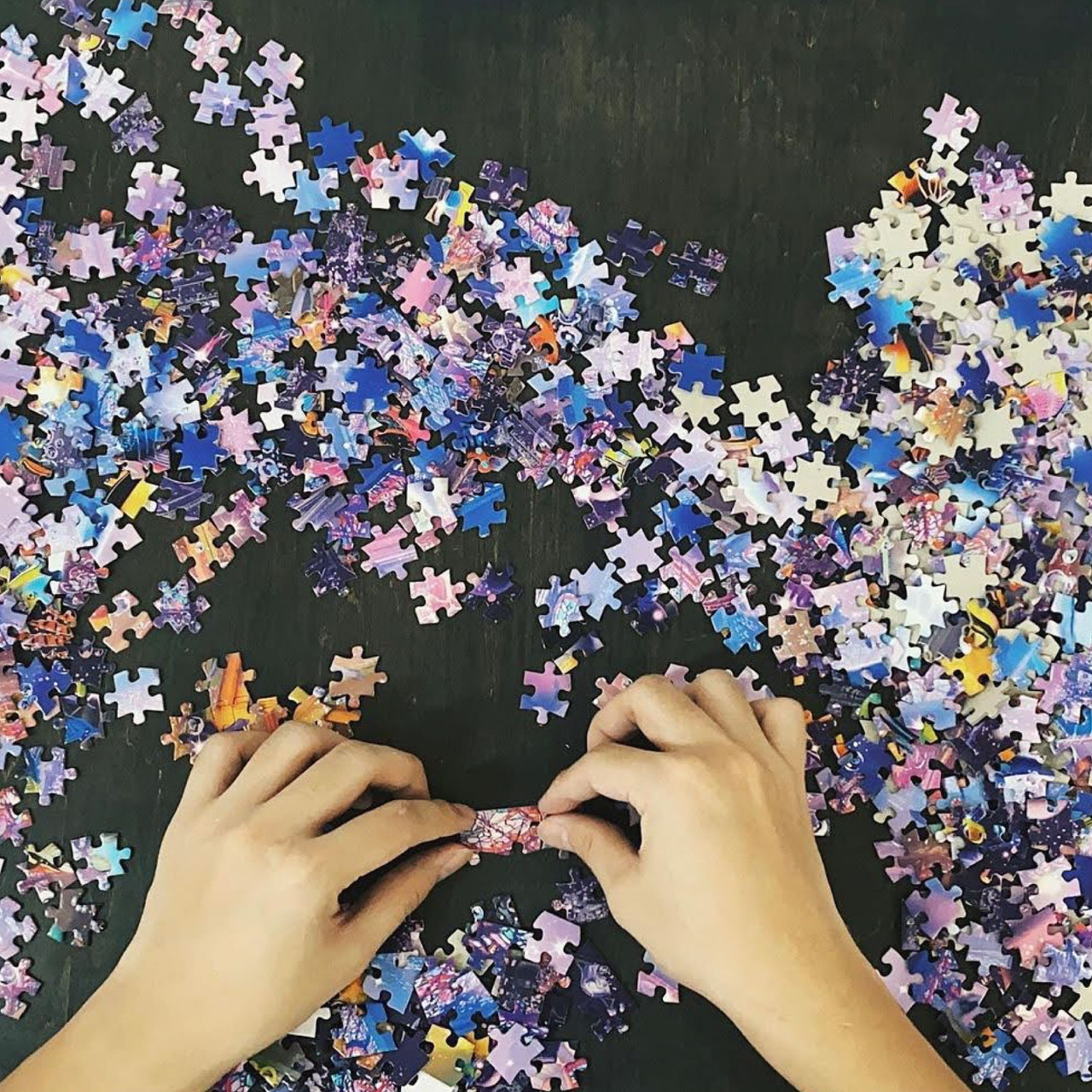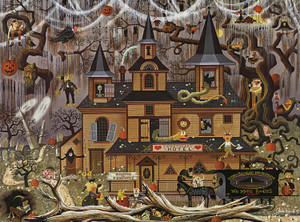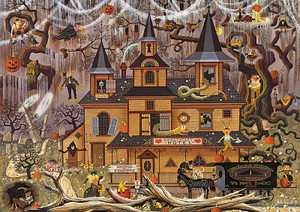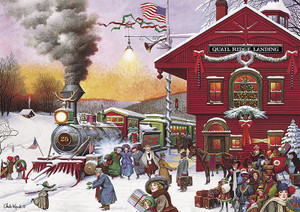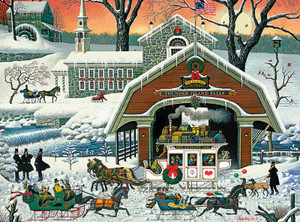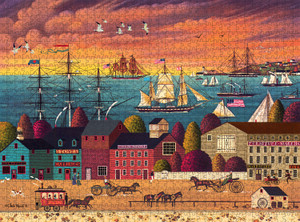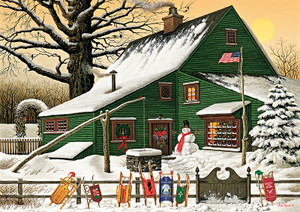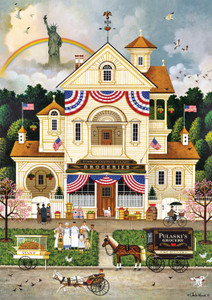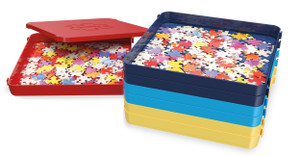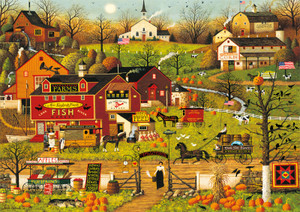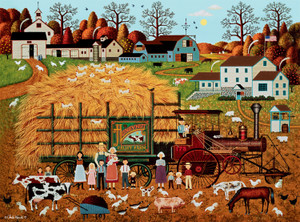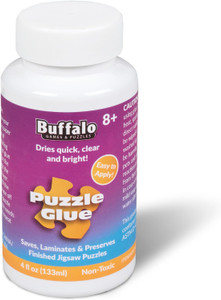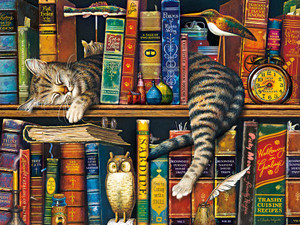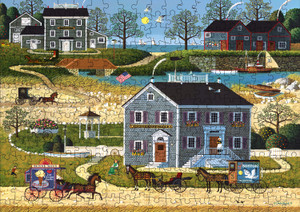Posted by Buffalo Games on Jun 28th 2022
What Are People Who Do Jigsaw Puzzles Called?
Ever since the British cartographer John Spilsbury created the first modern jigsaw puzzle in 1767, people have been hooked. However, at the time, they were not called jigsaw puzzles. Instead, they were known as dissected maps.
Credited as the inventor of the jigsaw puzzle, Spilsbury actually created the first one as an educational tool for children of the wealthy. He drew maps and then cut them into pieces so that by putting the pieces back together, children could learn geography.
The term “jigsaw puzzle” wasn’t used to describe these dissected maps until about 1880, when fretsaws were used to cut the puzzle shapes. By then, the puzzles depicted many subjects other than maps, including animals, people, landscapes, and more.
Dissected Maps of the 18th Century and Puzzle-Doers Today
It’s interesting that the term that was first used to describe John Spilsbury’s invention would have an impact on the name of people who do jigsaw puzzles centuries later.
There are some “unofficial” terms for these people, one of which is “puzzler.” You might see this term used across the internet, and obviously, the term makes perfect sense, so many people just go ahead and run with it.
However, a “puzzler” is not the correct, official term that describes a person who puts jigsaw puzzles together. The official term is a “dissectologist.”
The term seems like an ironic choice at first, especially if you don’t know the origins of the jigsaw puzzle. However, when you do know, it does make perfect sense. People who put together jigsaw puzzles are called dissectologists because the first jigsaw puzzles were called dissected maps.
Personality Traits of a Dissectologist
Did you know that there are certain character traits and personality types that are scientifically associated with dissectologists? You may or may not be familiar with the many personality tests that are popular across the internet, whether it’s a Buzzfeed quiz about which Harry Potter character you are most like or it’s the Myers-Briggs personality test.
Some of the most popular scientific personality tests include:
- Enneagram
- Big Five Assessment
- Workplace DISC Test
- Typefinder
- SHL Occupational Personality Questionnaire
- Caliper Profile Test
- Myers-Briggs Type Indicator
- Eysenck Personality Inventory
There are literally dozens of them, but they all exist to try to sort people, including dissectologists, into nice and neat little categories of personality types.
The Myers-Briggs Personality Test
The Myers-Briggs Personality Test may be the single most well-known personality test. This is a self-report inventory test that is based on Carl Jung’s theory of different personality types, and it was developed by Isabel Myers and her mother, Katherine Briggs. Both women extensively studied the work of Carl Jung, who was a Swiss psychiatrist and psychologist.
According to profiling with the Myers-Briggs test, many dissectologists who excel at putting puzzles together are people with personality types that are either INFJs or ISFJs. In other words, these are “Introversion, Intuition, Feeling, and Judgment” and “Introversion, Sensing, Feeling, and Judgment,” respectively.
Even though the two personality types are similar, they each have qualities that give them a unique edge when solving puzzles.
The INFJ Personality and Jigsaw Puzzles
This personality type is known as “The Advocate,” and it describes people who are both analytical as well as creative. These are two qualities that obviously would provide dissectologists with an advantage in solving puzzles. They have idealistic natures and enjoy using their minds.
These introverts enjoy puzzles with 1000 pieces, 2000 pieces, or more as a means of being able to let their minds wander and relax. They are also organized, have good intuition, are sensitive to the emotions of others, are artistic, and are leaders.
The ISFJ Personality Type
The ISFJ personality type is known as “The Defender,” and it describes people who are compassionate but reserved. They are quiet, but at the same time, they are always observing what’s going on around them. They excel at remembering small details, making them fantastic dissectologists.
Those with this personality type rely on facts and logic and are excellent at finding patterns. They are also organized and enjoy putting small details together to solve a larger problem. While the INFJ personality type often has a mind that wanders, the ISFJ is able to stay in the present moment, making them excellent with focus and concentration.
Curious as to what your personality type might be? Check out the Myers-Briggs Personality Test!
Everyone’s a Dissectologist!
The fact that the two personality types are mentioned doesn’t mean that if you are a different type, you are terrible at putting puzzles together! It just means that these two types have some advantages and qualities that boost their puzzling skills a bit.
All in all, it doesn’t matter what personality type you have; if you enjoy putting jigsaw puzzles together, that in itself can tell a lot about your personality. If you consider yourself a dissectologist, the chances are good that:
- You notice things about the world around you and are observant
- You remember small details about the little things
- You’re a problem-solver and look at things from all sides
- You’re very organized
- You love a good challenge and are goal-oriented
- You strategize to achieve success
- You enjoy art
- You’re patient and not in a rush to finish a puzzle
If you’re interested in how some of the other personality types fare with jigsaw puzzles, anyone who is a problem-solver, imaginative, loves a good challenge, enjoys time alone, can concentrate, and is analytical makes a great dissectologist.
Famous Dissectologists Who Love Jigsaw Puzzles
Jigsaw puzzles have been a beloved hobby for centuries, entertaining and sharpening the minds of millions of people of all ages. There are some puzzlers who are known around the world for one thing or another, and some of the most famous include:
- Hugh Jackman, actor
- Queen Elizabeth II, Queen of England
- Sir Patrick Stewart, actor
- Ellen DeGeneres, actress and talk show host
- Bill Gates, creator of Windows
- Kylie Jenner, reality show host and owner of Kylie Cosmetics
Whether you call them dissectologists or puzzlers, they all have a love of jigsaw puzzles in common, along with the sense of accomplishment, skill, and fun that goes along with them.
